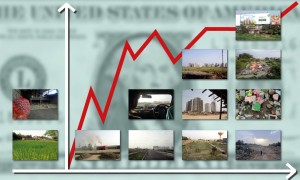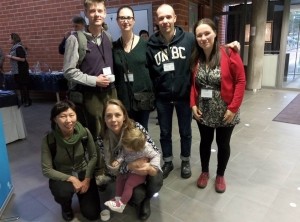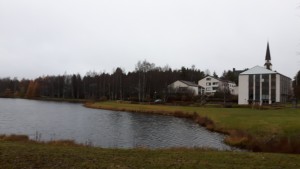Marija Launonen
Etmu Days 2015 conference, Rovaniemi
A two-day conference called “Mobile Roots – Rethinking Indigenous and Transnational ties” took place in Rovaniemi and I participated as a listener. The overnight travel by train was a must (as a student, I got 50% discount for the tickets – yay!) and that was the main reason why I chose the train trip over flying.
Rovaniemi welcomed me with cloudy, misty, grey weather with bare trees – you might think that it was the same weather as in Helsinki, but in reality in Helsinki at that time still was golden autumn. Rovaniemi just looked like Helsinki might look after few weeks.
The main building of the University of Lapland, is at least 2 km’s away from the railway station and city center. I just walked there with my backpack.
The conference itself was about two main topics – indigenous people and mobility. 4 keynote speakers and the programme are described in the conference webpage: http://etmudays.etmu.fi/
My favorite keynote speech was that of Florian Stammler, “Mobility and rootedness as values, opportunities and threats in the Russian North”. It was not only interesting and informative, but also provoking and somehow innovative. Stammler explored mobility from indigenous perspective and questioned what “mobility” really means. He was taking as an example Nenets nomadic lifestyle and questioned, are the reindeer-herding Nenets rooted or rootless since they are very mobile in their lifestyle? And then he was comparing them to Russian workers, who live in stationary oil and gas towns – are these people rooted or rootless because they lead stationary way of life? In fact, as he explored, Nenets are the rooted people, despite them being nomadic, because they stay on their land by circular mobility, while Russian oil and gas workers are rootless, because they don’t stay long in Northern towns – usually just half-year. Stammler questioned the image of “mobility” in relation to “rootedness”.
I also participated in two workshops, one combining two topics: “Indigenous peoples’ self-determination over their culture and cultural heritage including sacred sites: challenges and best practices” and “Uprooted by Neoliberal Development: Forced Migration and Displacement in the Global South/North”. It was really interesting, and I was surprised by noticeable presence of researchers from Southern Asia! One researcher originally from Bangladesh, Afroja Khanam (University of Lapland), in her speech about “The cost of Neoliberal Development: The case of Padma bridge in Bangladesh”, spoke about forced migration in Bangladesh due bridge building. Another Bangladesh researcher, Shahnaj Begum (University of Lapland), spoke about “Challenges to the Human Security of Elderly Sámi in Finnish and Swedish Lapland”. She was an example of a researcher from South who is researching the North. Shahnaj Begum very kindly allowed to share her presentation in this blog. So here you are:
https://drive.google.com/file/d/0BwVBZuUh2b82X0ExNDNVRDJHLVU/view?usp=sharing

Tiina Seppälä’s collage related to her speech “Uprooted by Neoliberal Development: Social Movements Contesting Development-induced Displacement in Kolkata and Kathmandu”.
Another speaker, Tiina Seppälä (University of Lapland), was a more classical example of a researcher from North working on issues in South Asia (although she also works on global research) and spoke about “Uprooted by Neoliberal Development: Social Movements Contesting Development-induced Displacement in Kolkata and Kathmandu”. She also touched on similar issue as Afroja Khanam did, on forced migration of thousands of people in South Asia due to new construction projects. However, as they also recognised, Tiina Seppälä’s approach was more theoretical, while Afroja Khanam was more empirical. Unfortunately I don’t have presentations of neither speech, but Tiina Seppälä sent me this collage related to her topic:
Ajeet Narain Mathur, from the Indian institute of management in Ahmedabad, gave a presentation about “Diasporic Indigeneity around ties and ruptures in alien meta-cultures“. His speech was very theoretical, and not easy to understand.
Another speaker was touching on more practical issues, Stefan Kirchner (University of Lapland). He spoke about “Indigenous sacred sites as Tourist Magnets” and kindly allowed me to share his presentation in this blog, so you can look at it:
https://drive.google.com/file/d/0BwVBZuUh2b82N2hkV2FWNUlsQVU/view?usp=sharing
In the second day, a workshop about “Moving memories: Oral histories about people’s movements across social, temporal, spatial and ideological borders” hosted different presentations, mostly related to Anthropology, but one was related to Geography. It was a presentation by two young Russian researchers, Svetlana Utsenyuk and Ilya Abramov (both from the Institute of History and Archaeology, Russia), on “Storied mobility”. Biographies of technologies and practices of movement among Russian reindeer nomads”. They talked about their ongoing research project, employing mixed research methods – both qualitative and quantitative. They researched mobility of reindeer-herders using oral histories, GPS technologies, and other. So far they made a field trip in Kola peninsula, but in the next years they are planning to go to Yamal peninsula and Chukotka.
The conference trip was a great success to me. I met many nice people, including the researchers.

Some researchers and a student. Top row (from left to right): Ilya Abramov (Institute of History and Archaeology, Russia), Svetlana Utsenyuk (Institute of History and Archaeology, Russia), Dudeck Stephan (one of conference’s organisators) and Marija Launonen (a Development Geography student from University of Helsinki). Bottom row: Roza Laptander (University of Groeningen. She represents indigenous people Nenets), Tatiana Vagramenko (National University of Ireland Maynooth) with her little daughter.
